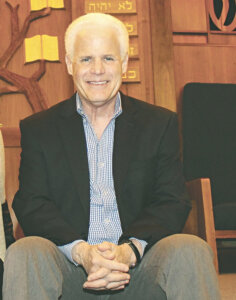Springfield, Ohio, rabbi uses racist stereotypes to describe Haitian migrants
Other members of Springfield’s community declined to speak to the press

A mural is displayed downtown in Springfield, Ohio. Photo by Luke Sharrett/Getty Images
The part-time rabbi at the only synagogue in Springfield, Ohio, told the Jewish Telegraphic Agency that Haitian migrants are disenfranchising the town’s citizens, claiming that two members of his congregation had been “forced to move” out of an apartment complex and injured in a car accident because of the influx.
Rabbi Cary Kozberg did not supply evidence to support the claims, which appeared in an interview loaded with racist stereotypes and generalizations that was published on Thursday. Kozberg, a supporter of former President Donald Trump who works part-time at Springfield’s small Reform synagogue, Temple Sholom, described the situation as “a culture clash.”
“Haiti is not known for its, shall we say, adherence to Western civilized values,” Kozberg said, according to the JTA article by Andrew Lapin.
“When Jews came here, they wanted to assimilate, they wanted to be good Americans,” he added. “That’s not necessarily the case with these folks, and that’s where a lot of the frustration is.”
Kozberg’s incendiary comments came more than a week after Trump repeated baseless rumors that Haitians in Springfield were eating their neighbors’ pets in a nationally televised presidential debate.
The bizarre accusation has been denounced by the Jewish immigrant-aid group HIAS and debunked by the town’s mayor, Ohio’s governor and the woman who originally posted the idea on Facebook. But Trump and his running mate, Sen. JD Vance of Ohio, have nonetheless continued to promulgate it, and the town has been besieged in recent days by bomb threats, anti-immigrant fliers and visits by the white supremacist group Proud Boys.
An estimated 12,000 to 20,000 Haitians, the vast majority of whom are in the United States legally, have moved to Springfield in the last few years, filling a labor shortage at auto plants the city brought in to revive its economy. Local officials say their arrival has strained the schools and other public services in the town, whose previous population was about 60,000.

Rabbi Kozberg told JTA he had no evidence the pet-eating rumors were true and, like Springfield’s mayor, is unhappy that Trump’s repetition of them had thrust the town into the spotlight.
“I feel frustrated,” he said. “And I feel the need to educate my fellow Jews that Jewishly, we should be addressing this in a Jewish way, and not the way other people are.”
He explained: “From a Jewish point of view, things are never black or white.”
JTA reported that Temple Sholom, the Springfield congregation Kozberg serves, has about 30 member-households. Members of the synagogue declined to speak with JTA, including the synagogue president, who — in a message via an intermediary — cited fears of retribution from hate groups.
Kozberg himself does not live in Springfield, but 50 miles away, in Columbia. He was ordained as a Reform rabbi, but told JTA he no longer identifies with the movement because of its progressive political stances. He is an advocate of gun ownership who in 2020 recorded a video message for the Republican Jewish Coalition in which he said that Trump “has done more for Israel and the Jewish people than any of his predecessors.”
JTA noted that he also wrote a recent essay titled “The Reform Movement Left Me,” in which he said that “the age-old, honored rabbinic methodology of discussion and debate to learn and deduce holy behavior is no longer encouraged” by the movement. In the interview, Kozberg added, “there’s not much room for people of my political persuasion.”
Certainly, Kozberg’s views on the Springfield situation are out of step with Reform leadership.
“The lies being spread about the Haitian migrant community in the U.S. are not only absurd, but deeply dangerous,” Rabbi Jonah Pesner, director of the Religious Action Center of Reform Judaism, said in a statement to JTA. “Political leaders, community leaders, and faith leaders – including rabbis – have an obligation to push back.
“As Jews, we are all too familiar with the danger of spreading conspiracy theories about minority groups,” Pesner added. “We condemn it and urge others to do the same.”
Kozberg acknowledged in the JTA interview that his views are not shared by everyone in his congregation, which he described as both ideologically and denominationally diverse. He also said he always cites Jewish texts to support his political views — and that his understanding of the Jewish commandment of tzedakah, or charity, is relevant in the current moment.
“Tzedakah is about concentric circles,” he said. “If other people are helping the Haitians, God bless. I’m not saying they shouldn’t be helped. But I think there needs to be a focus on the folks that have been disenfranchised by what’s going on.”
The article did not specify what he meant by disenfranchisement.
Further citing Jewish text, the rabbi compared Trump and Vance to the biblical figure Jephthah, a judge who became a leader of the Israelites and who, notoriously, had to sacrifice his own daughter after making an ill-conceived promise to God.
“What came out of his mouth got him into a lot of trouble,” Kozberg said, “but he was the person that was needed at the time.”
A message from our Publisher & CEO Rachel Fishman Feddersen

I hope you appreciated this article. Before you go, I’d like to ask you to please support the Forward’s award-winning, nonprofit journalism so that we can be prepared for whatever news 2025 brings.
At a time when other newsrooms are closing or cutting back, the Forward has removed its paywall and invested additional resources to report on the ground from Israel and around the U.S. on the impact of the war, rising antisemitism and polarized discourse.
Readers like you make it all possible. Support our work by becoming a Forward Member and connect with our journalism and your community.
— Rachel Fishman Feddersen, Publisher and CEO




























